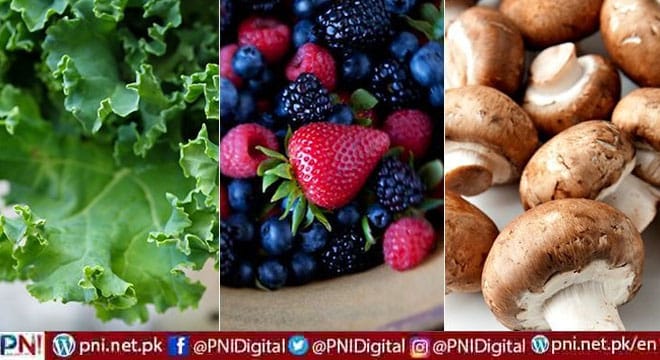ISLAMABAD, Feb 02 (Online): Depression is such a common mental health disorder that it affects around 5%Trusted Source of all adults around the world, according to World Health Organization (WHO) estimates.
There are different types of depression — such as major depressive disorder and persistent depressive disorder lasting for at least 2 years.
The causes of depression are often manifoldTrusted Source, with both genetic and situational risk factors involved — specific stressors or conditions, acting as triggers, leading to recurrent major depressive episodes.
And while targeted therapy and medication help many overcome or manage their symptoms of depression, these interventions do not work equally for everyone.
This has led researchers to cast their nets even wider in looking for all the factors that may contribute to depression, as well as for novel approaches for depression treatments and symptom management.
Recently, diet has come to the forefront of medical research, with experts debating the pros and cons of using dietary interventions to treat or even prevent different medical conditions.
Over the past few years, several studies have suggested that opting for healthier diets rich in vegetables, fruit, and whole grains may help improve depression symptoms.
For instance, one study from April 2022 from the University of Technology Sydney found that men aged 18–25 years experienced an improvement in depression symptoms after switching to a Mediterranean diet. But it remains unclear what mediates the link between diet quality and mental health.
In December 2022, two studies published in Nature Communications looked at the link between gut microbiota and depression symptoms. One of the studies found that 13 types of bacteria, in particular, are associated with depression symptoms.
It may be the way in which these bacteria lead to the activation of different signals in the brain that may explain the link between the bacterial makeup of the gut and depression symptoms, researchers hypothesize.
And this is also where diet comes in: By making certain dietary changes, we may be able to influence the abundance of certain bacterial species in the gut and, by extension, the communication between the gut and the brain, leading to an improvement in depression symptoms.
In this month’s installment of our In Conversation podcast, we discuss the whys and hows of diet’s potential impact on mental health, specifically on depression symptoms, with one of the authors of the Nature Communications study looking at gut bacteria and depression symptoms, Dr. Najaf Amin.
Dr. Amin is a senior research associate in the Nuffield Department of Population Health at the University of Oxford in the United Kingdom, and one of her areas of interest is using genomics data to zero in on biomarkers of neuropsychiatric traits.
Our other guest on this month’s episode is Rachel Kelly, a U.K.-based mental health advocate, writer, and journalist who has been outspoken about the ways in which dietary interventions helped treat her own instances of depression.
Kelly’s book, The Happy Kitchen, sold as The Happiness Diet in the United States, is a compilation of healthy recipes based on information gathered from nutritional studies whose aim is to boost mood and increase energy levels.
You can listen to this month’s installment of our podcast below, or on your preferred streaming platform.
Depression and the gut
In their study from 2022, Dr. Amin and her colleagues analyzed data from 1,133 participants in the Rotterdam StudyTrusted Source, asking whether there was a link between the compositions of the gut microbiota and experiencing symptoms of depression.
The researchers foundTrusted Source that the presence of certain microbial genera — including Eggerthella, Coprococcus, Sellimonas, Lachnoclostridium, and Hungatella — were linked to depression.
“We identified 13 microbiota, and those were associated with depression. I
think most of them were protective, so they were decreased in depression. And then there were a few [bacteria] that were increased in depression,” Dr. Amin explained in the podcast.
The abundance of some bacteria, in particular, such as those belonging to the Eggerthella genus, appeared to be connected to an increase in depression symptoms.
In their study, the researchers explain that these bacteria are involved in the synthesis of certain neurotransmitters, or chemical messengers, whose activity may, in turn, be involved in the expression of depression symptoms. These chemicals are glutamate, butyrate, serotonin, and gamma amino butyric acid (GABA).
Previous research has suggested that people with a diagnosis of depression have higher levels of glutamateTrusted Source in their systems than their depression-free peers, while lower-than-usual levels of butyrateTrusted Source have been linked to symptoms of depression in people with Parkinson’s disease. Lower levels of GABATrusted Source are also tied to depression.
And while last summer, a major review of the literature cast doubtsTrusted Source over the prevailing theory that low serotonin levels are at least partly to blame for depression symptoms, newer small-scale studies continue to contend that the serotonin theory of depression still holds ground.
Dr. Amin and her colleagues suggest that butyrate, in particular, may be of importance in explaining the potential mechanisms through which some gut bacteria might influence mental health.
“In the gut microbiome, you have the short-chain fatty acid-producing bacteria [which synthesize] the three short-chain fatty acids, including acetate, propionate, and butyrate. And all three of them, they act as energy providers also,” Dr. Amin explained in the podcast.
“But they also have the ability to change the expression of a gene, [to] switch it on [or] switch it off. It doesn’t change the genetic code, but what it does is it changes the levels of proteins that a certain gene is producing, so indirectly affecting what your genes are giving you,” she noted.
Follow the PNI Facebook page for the latest news and updates.









